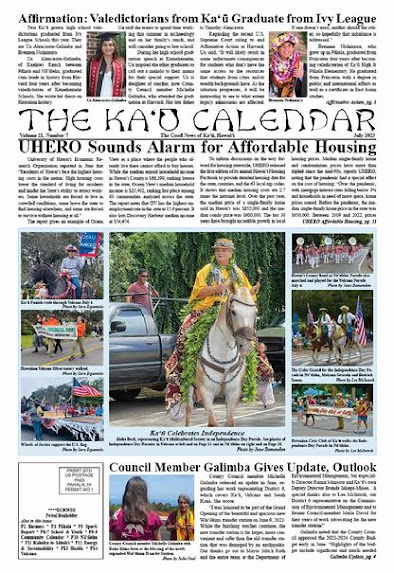 |
| Gov. Josh Green at U.N. Headquarters in New York City on Wednesday where he gave a Voluntary Local Review on Hawai'i's Sustainable Development. Photo from the Governor |
GOV. JOSH GREEN REPORTED TO THE UNITED NATIONS ON HAWA'I'S SUSTAINABLE DEVELOPMENT. On Wednesday, Green presented Hawaiʻi's second Voluntary Local Review to the UN during the High-Level Political Forum on Sustainable Development. A statement from his office called it a "good news/bad news scenario. The review highlights progress on achieving the six Aloha+ Challenge goals, which are the state's local implementation of the UN's 17 Sustainable Development Goals, and clearly defines what is lacking. Hawaiʻi stands as the sole state in the United States to have submitted a VLR, with the report being prepared by Hawaiʻi Green Growth with input from local partners."
The Governor said, "As the world reels with new undeniable impacts of climate change, it lends another level of urgency that Hawaiʻi youth express in the Voluntary Local Review: 'We cannot put off changing things any longer. We refuse to stand idle when 2030 looms closer and closer...We only have one Island Earth, let us do our best to take care of it and each other. We are one species, with one planet, one chance.'"
Hawaiʻi's status on its goals can be seen on the Aloha+ Dashboard for predictive planning at https://aloha-challenge.hawaiigreengrowth.org/dashboard/. The Governor said that the state is on track to meet its 2030 targets on renewable energy and energy efficiency, but not for clean transportation with its goal of reducing petroleum usage to 165 million gallons per year. The most recent data show that 472 gallons per year were used.
The Governor said, "As the world reels with new undeniable impacts of climate change, it lends another level of urgency that Hawaiʻi youth express in the Voluntary Local Review: 'We cannot put off changing things any longer. We refuse to stand idle when 2030 looms closer and closer...We only have one Island Earth, let us do our best to take care of it and each other. We are one species, with one planet, one chance.'"
Hawaiʻi's status on its goals can be seen on the Aloha+ Dashboard for predictive planning at https://aloha-challenge.hawaiigreengrowth.org/dashboard/. The Governor said that the state is on track to meet its 2030 targets on renewable energy and energy efficiency, but not for clean transportation with its goal of reducing petroleum usage to 165 million gallons per year. The most recent data show that 472 gallons per year were used.
The goal to double food production by 2030, first introduced by the 2050 Sustainability Plan in 2008, is not on track, said Green. "Production of most crops has not increased at a pace to reach the goal, but there was a 4% increase in the number of farms from 2012 to 2017. Progress, however, is difficult to measure because of a lack of funding for agricultural statisticians."
The progress on the health, nutrition and access goal was hindered by the pandemic when food insecurity increased from 11.2% to 16.8% between 2018 and 2020, said the Governor.
Regarding the ocean, he said, "Existing conservation commitments and the Sustainable Hawaiʻi Initiative informed the natural resource management goal of effectively managing 30 percent of Hawaiʻi's nearshore waters by 2030.
"Watershed Projection (20.5% of the 30% target reached) and invasive species control (68% of 147 recommended actions ongoing, initiated, or complete) are both on track while freshwater security, marine management and protection of native species need work."
Green said that the solid waste goal recommits to a previous law mandating a 50% reduction by 2000 and an increase in 2020 to 70% by 2030. "Recycling is the good news on this goal with 695,931 tons recycled and composted as of 2021. Waste diversion as of 2015 is at 43% of its 70% target.
The progress on the health, nutrition and access goal was hindered by the pandemic when food insecurity increased from 11.2% to 16.8% between 2018 and 2020, said the Governor.
Regarding the ocean, he said, "Existing conservation commitments and the Sustainable Hawaiʻi Initiative informed the natural resource management goal of effectively managing 30 percent of Hawaiʻi's nearshore waters by 2030.
"Watershed Projection (20.5% of the 30% target reached) and invasive species control (68% of 147 recommended actions ongoing, initiated, or complete) are both on track while freshwater security, marine management and protection of native species need work."
Green said that the solid waste goal recommits to a previous law mandating a 50% reduction by 2000 and an increase in 2020 to 70% by 2030. "Recycling is the good news on this goal with 695,931 tons recycled and composted as of 2021. Waste diversion as of 2015 is at 43% of its 70% target.
"Public, private and community recommendations contributed to the smart sustainable communities' goal which measures affordable housing, economic prosperity, disaster management, resilience, and mobility. Economic prosperity as measured by the Self Sufficiency Standard income level improved from 45.5% in 2014 to 34.7% in 2020. But in 2020, 9% of people were below the federal poverty line and 33% were Asset-Limited Income-Constrained Employed (ALICE) households."
There was some decrease in miles traveled per vehicle, but 67.2% of commuters still drive alone, 13.5% carpool and only 4.9% use public transportation.
There was some decrease in miles traveled per vehicle, but 67.2% of commuters still drive alone, 13.5% carpool and only 4.9% use public transportation.
The housing affordability index is trending downwards from 98.5 in Q1 2015 to 82.2 in Q4 2021. "More data are needed to assess resilience, but a local index is being developed. The state's vulnerability increased on the Social Vulnerability Index – from 0.468 in 2018 to 0.400 in 2020 on a scale of 0 to 1 from the least to the most vulnerable."
The statement said that the green workforce and education goal recognizes the importance of education, jobs, innovation and an integrated green economy in achieving Hawaiʻi's sustainability goals.
"The goal measures workforce development – needs improvement but as of February 2023, the unemployment rate decreased to 3.2%; educational attainment looks good with 85.9 percent of students graduating from high school on time as of 2021, and of residents 25 and older, 92.3 percent of at least a high school diploma and 32.9% have at least a bachelor's degree as of 2018; equitable access to education also looks good with 86.6% of youth (16 to 24) attending school or employed, up from 85% in 2010; and finally sustainable tourism, which needs improvement – 46 businesses were certified as sustainable eco-tourism businesses as of 2020 – but better data are needed for more accurate measurement.'
Green represented Hawaiʻi at two events at the 2023 United Nations High-Level Political Forum, the only U.S. state leader to do so. His remarks at the Local and Regional Governments Forum and the Local2030 Coalition Special Event noted "Hawaiʻi's unique contribution to the global community rooted in its community values." The Governor also extended Hawaiʻi's spirit of Aloha via Hawaiʻi Green Growth UN Local2030 Hub, the Local2030 Islands Network, and the Aloha+ Dashboard as key platforms for achieving the UN Sustainable Development Goals locally and globally," said the statement from his office.
To read comments, add your own, and like this story, see facebook.com/kaucalendar. See latest print edition at kaucalendar.com, in the mail and on stands.
 2023 HAWAI'I LEGISLATURE BILLS SIGNED BY GOV. JOSH GREEN were the subject of an announcement by the Governor on Wednesday. He said that as of July 12, he had hosted 18 bill signing ceremonies covering topics from good governance, affordable housing, destination management at state parks, to protections for victims of domestic violence, traffic safety, and cost of living. Green also signed more than 100 additional bills, separate from the ceremonial signings in his public office and that he issued 11 vetoes on July 7, "due to serious legal and programmatic concerns."
2023 HAWAI'I LEGISLATURE BILLS SIGNED BY GOV. JOSH GREEN were the subject of an announcement by the Governor on Wednesday. He said that as of July 12, he had hosted 18 bill signing ceremonies covering topics from good governance, affordable housing, destination management at state parks, to protections for victims of domestic violence, traffic safety, and cost of living. Green also signed more than 100 additional bills, separate from the ceremonial signings in his public office and that he issued 11 vetoes on July 7, "due to serious legal and programmatic concerns."He thanked legislative leaders and key stakeholders for "helping pass important legislation for our state's priorities. While this past session was chaotic toward the end, the Hawaiʻi State Legislature still managed to support major areas for our residents. Critical funding was passed to shore up our statewide health care system, address housing and homelessness, take on climate initiatives, and lower the cost of living for residents. We've balanced the budget and I look forward to executing on the successes of last session." On Wednesday, five bills became law without the Governor's signature. He said they will become law without his signature "because on balance, they are more beneficial than objectionable, and reflect strong stakeholder support for these measures."
These bills, with summaries, are as follows:
SB45 SD1 HD2, Relating to Minors, which will be enacted as Act 259Description: Allows minors 16 years of age or older and emancipated minors to petition for domestic abuse protective orders.
 HB161 HD1 SD1 CD1, Relating to Collective Bargaining, which will be enacted as Act 260Description: Establishes that the representative of labor on the Hawaiʻi Labor Relations Board shall be a person selected by a majority of the exclusive representatives of the collective bargaining units.
HB161 HD1 SD1 CD1, Relating to Collective Bargaining, which will be enacted as Act 260Description: Establishes that the representative of labor on the Hawaiʻi Labor Relations Board shall be a person selected by a majority of the exclusive representatives of the collective bargaining units.HB717 HD1 SD2 CD1, Relating to Nepotism, which will be enacted as Act 261Description: Prohibits, under certain circumstances, state employees from appointing, hiring, promoting, or retaining relatives and household members and from making or participating in certain other employment-related decisions and from awarding a contract to or otherwise taking official action on a contract with a business if the employee's relative or household member is an executive officer of or holds a substantial ownership interest in that business.
HB923 HD1 SD1 CD1, Relating to Bonds, which will be enacted as Act 262Description: Requires (1) counties with a private activity bond issuance program to exhaust their allotment before applying to the state for the state allocation and (2) the state, if it receives a county allocation, to award that same amount to project or projects in that county.
HB1359 HD2 SD2 CD1, Relating to Hemp, which will be enacted as Act 263Description: Repeals redundant regulations on hemp production; recognizes the unique constraints of Hawaiʻi farmers; permits the licensure of hemp producers to sell hemp biomass; establishes of the Hawaiʻi Hemp Task Force.
The Governor summarized that in his term to date, he has enacted the following laws for the people of Hawaiʻi:
Affirming reproductive rights Good Government Grouping Part 1 (7 bills)
Firearms Bills (2 bills)
Vaping Bill Hāʻena State Park Bill
Domestic Violence/Sex Assault (8 bills)
Child Welfare Bills (7 bills)
Affordable Housing and Homelessness (10 bills)
Health Care Access (13 bills)
Good Governance Part 2 (19 bills)
Tax Credit Bill and the State Budget
Education and Early Education Bills (11 bills)
Agriculture Bills (11 Bills)
Clean Energy and Climate Bills (6 bills)
Beaches and Shoreline Bills (11 bills)
Traffic Safety Bills (7 bills)
Kūpuna and Disability Access Bills (13 bills)
To read comments, add your own, and like this story, see facebook.com/kaucalendar. See latest print edition at kaucalendar.com, in the mail and on stands.
 LIBRARIES IN KAʻŪ WILL BE OPEN FIVE DAYS A WEEK starting next Monday, July 17, with publications, computers and events for the public.
LIBRARIES IN KAʻŪ WILL BE OPEN FIVE DAYS A WEEK starting next Monday, July 17, with publications, computers and events for the public.
Pāhala School & Branch Manager Sara Kamibayashi reports that Pāhala will be open Mondays, 9 a.m. to 1 p.m. and 2 p.m. to 4 p.m., Tuesdays 10 a.m. to 1 p.m. and 2 p.m. to 6 p.m., Wednesdays 9 a.m. to 1 p.m. and 2 p.m. to 4 p.m., Thursdays 10 a.m. to 1 p.m. and 2 p.m. to 6 p.m. and Fridays noon to 4p.m.
Nā'ālehu Public Library will be open Mondays 9 a.m. to noon and 1 p.m. to 4 p.m., Tuesdays 10 a.m. to noon and 1 p.m. to 6 p.m., Wednesdays 9 a.m. to noon and 1 p.m. to 4 p.m., Thursdays 10 am. to noon and 1 p.m. to 6 p.m., and Fridays noon to 4 p.m.
To read comments, add your own, and like this story, see facebook.com/kaucalendar. See latest print edition at kaucalendar.com, in the mail and on stands.

Five thousand in the mail, 2,500 on the street.
See the July edition of The Kaʻū Calendar Newspaper
www.kaucalendar.com
-2.png)




.jpg)




.heic)





.jpg)

